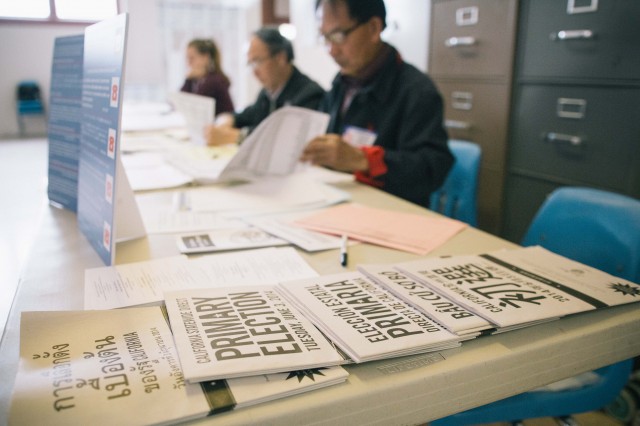2. No Money, Honey: Somewhere, political scientists will spend a lot of time examining the candidates who came oh-so-close on Tuesday without hardly lifting a financial finger. There's Ron Gold, the Calabasas lawyer who wrote himself a $5,000 check this past spring to run for attorney general, raised no more money and yet looks to be the sole survivor to take on incumbent Democrat Kamala Harris. Or, consider David Evans, a Central Coast Republican who hasn't raised a single dime but may end up (once all ballots are counted) as a top-two finisher in the race for state controller, a result that would shut out both prominent Democrats.
In the state's most expensive legislative race, Democrat Steve Glazer — the former campaign consultant to Governor Brown — appears to have failed to secure one of the two spots on the fall ballot in the East Bay's 16th Assembly District, even after a multimillion-dollar boost by business groups via an independent political action committee.
Does money still matter? Of course it does. But in a few interesting cases, this super ho-hum statewide primary showed other things can come into play.
3. Top Two, Nothing New? This was California's first election where statewide races were conducted under the primary system enacted by voters in 2010. And stepping back, it looks to have changed ... well, almost nothing. Of eight statewide offices, only one looks to have come close to being a same party do-over this fall (state controller). And digging down below the top races, to congressional and legislative contests, a lot of those are also going to end up as Democrats versus Republicans. In part, that may be because nonpartisan, independent candidates remain a rarity. In some races, like the Beverly Hills-centered 33rd District congressional race, Democrats had so many candidates that the split allowed even the outnumbered Republicans to successfully push a candidate into the top two vote-getters.
4. Occupational Hazard: Politicos have long debated what is, and isn't, a fair ballot label for a California candidate. And when a voter doesn't know much about the candidate, might that label help? When you're choosing a top schools official, doesn't voting for a teacher sound pretty good? Lydia Gutierrez, a Southern Californian who called herself a "teacher" on the ballot, came reasonably close to making the November runoff in the race for state superintendent of public instruction. And the aforementioned David Evans, the GOP controller candidate, was listed on the ballot as "accountant." Who wouldn't want an accountant as the state's chief money watcher?
And we can't talk about the help of ballot labels without mentioning Leland Yee, the San Francisco state senator accused of political corruption but whose decision to abandon the race for secretary of state came too late to be removed from the ballot. His ballot label? "California state senator." As of early morning, the embattled politician had racked up almost 288,000 votes — good enough for third place in a field of eight candidates.
5. November Narratives: So what to watch come Nov. 4? Likely a mix of California and national themes, depending on the race and candidate. In the 7th Congressional District outside Sacramento, expect an intense debate about the Affordable Care Act between incumbent Democratic Rep. Ami Bera and GOP challenger Doug Ose (who himself was an area member of Congress from 1999 to 2005.) In congressional races in the San Joaquin Valley's 10th and 21st districts, Republican incumbents Jeff Denham (10th) and David Valadao (21st) will work hard to promote immigration reform, even as their national parties have stalled on the issue in Washington, D.C.
And in the top race, where the household name Jerry Brown takes on the new kid on the block Neel Kashkari, expect some national and some state themes. California's economic recovery, the state's business regulations, the future of the ambitious high-speed rail project and the newly fired-up national debates over guns and climate change could all come into play. There's plenty to chew on in the next 153 days.
